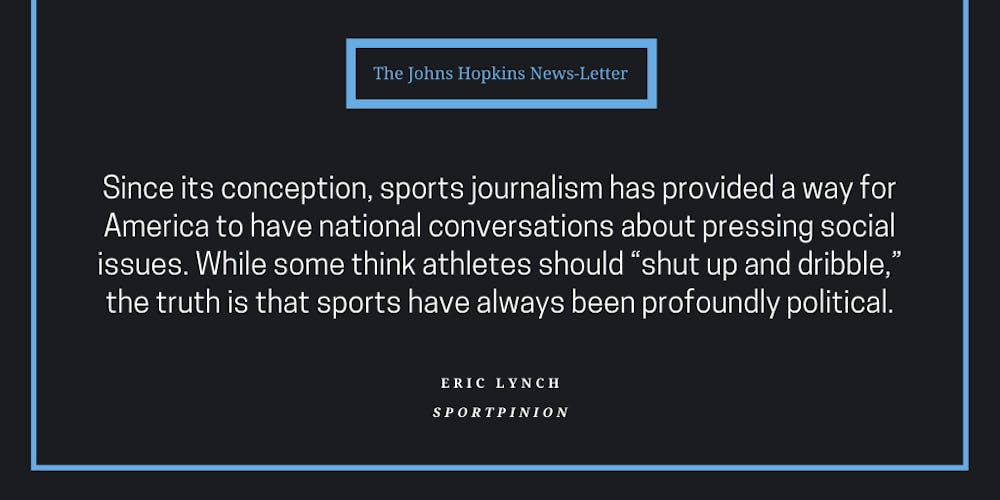
When I first joined The News-Letter during my freshman fall, I wanted to write for the News and Features section. I had known for a long time that I wanted to get involved in my college newspaper and to me, that meant writing about the news. But after going to the section’s first meeting, I felt intimidated and out of place; going to events and interviewing random people was just a bit too much for my nervous freshman self.
A few days later, I was eating at the Fresh Food Café when I got an email that the Sports section would be meeting in a few minutes in the Mudd Hall Atrium. I figured that I had the time and it was close by, so I might as well go. The editors were welcoming and facilitated my first ever article for The News-Letter.
I wrote about National Basketball Association player Jimmy Butler and his request to be traded from the Minnesota Timberwolves; since then, he has already changed teams twice. After that, I got roped into writing every week for Sports. And so, more out of chance and convenience than desire, I became a regular Sports writer.
Quickly, I started asking questions like “Why am I writing about this? Do sports even really matter?” In my sophomore year, I became one of the editors for the Sports section, but these questions didn’t go away. By that point I was a Sociology major learning about the pressing problems facing the most marginalized populations; why was I spending time every week writing about people throwing a ball around?
When the pandemic hit, our Public Editor at the time, Jacob Took, interviewed various editors for an article discussing The News-Letter’s reaction to the rapidly changing circumstances. In my interview, I spoke to Jacob about how I was glad that sports leagues were shutting down because it helped the world recognize that there are more important things than sports and entertainment. He ended up titling the article “There’s something more important,” a direct quote from my interview.
My doubts about the importance of sports persisted. I thought about making the jump to becoming an editor for another section, perhaps News or Opinions. But somehow, I couldn’t bring myself to leave the comfort of my beloved Sports section. I stayed as an editor for another year, and I can say confidently that I have never regretted it.
Now, my views haven’t changed all that much; I still believe that there are far more important things happening at Hopkins than sports. Exposing harmful administrative practices or covering a marginalizing problem on campus is usually going to have a bigger impact than recording the football score from last weekend. But that doesn’t mean sports journalism is unimportant. Even at a school like Hopkins, where the majority of students seldom interact with the University’s athletic teams, I am proud to cover sports for The News-Letter.
Sports journalism has a long history, going back to the early 1800s. Covering competitions between the American North and South or between different countries was a way to understand geopolitical conflict without violence. In the 1900s, when sports leagues became far more modern, media coverage responded to the popularity. Soon, sports sections were standard in every newspaper.
Now let’s be honest here: A decent portion of the value of sports news comes from its role as entertainment. Sports are fun! They can be fun to watch, fun to talk about and, more relevantly, fun to read about. And that’s not a bad thing; people need fun in their lives. Whether it’s sports, music, celebrities, video games or anything else, there has always been news coverage that serves primarily to discuss entertainment.
Additionally, sports are unitive. Baltimoreans can love or hate the mayor, but in the end, everyone roots for the Ravens. On campus, Hopkins athletics provide something for students to rally around. Attending a sports game and cheering for classmates can help form new friendships and relieve academic stress. And after experiencing the isolating aspects of the pandemic, the return of sports can be a real way for people to make their way back into social life.
This semester, I have been happy to see a growing initiative, The Flock, that encourages students of all kinds to attend sports games together. Despite the reputation for sports apathy at Hopkins, a growing number of people are finding that these games can be meaningful and fun.
But while the fun and psychosocial effects of sports are great, sports journalism has never been solely about sports. There are countless examples even from my time at Hopkins. Former Sports Editor Gregory Melick wrote an article discussing Kareem Hunt and the issue of domestic violence. My former co-editor Matthew Ritchie wrote an article exploring racism in the expectations for Black athletes. Current editor Cynthia Hu wrote an article calling for more representation of women in sports. While each of these articles is related to sports, none are really about sports.
Since its conception, sports journalism has provided a way for Americans to have national conversations about pressing social issues. While some think athletes should “shut up and dribble,” the truth is that sports have always been profoundly political. Of course, this goes beyond The News-Letter. Look at this year’s winner of the Dan Jenkins Medal for Excellence in Sportswriting, Mitchell S. Jackson, for writing “Twelve Minutes and a Life: Ahmaud Arbery went out for a jog and was gunned down in the street. How running fails Black America.” Clearly, sports in our culture transcend simple pastimes and are instead intertwined with the way our society functions.
Hopefully, you are starting to see my point. From Jesse Owens to Jackie Robinson to Colin Kaepernick and everyone in between, sports have always been a way for Americans to engage with one another about topics that are far bigger than championships. And the forum for much of that conversation comes in the form of sports journalism.
Nowadays, we have The Players’ Tribune and social media, so players can enter this conversation more directly themselves. Giving student-athletes a platform to speak has always been one of the primary goals of The News-Letter’s Sports section. And hopefully, even as I graduate from Hopkins this month and leave The News-Letter behind, these kinds of conversations can keep occurring between athletes, fans and even the students and alumni who couldn’t care less about the final scores.





